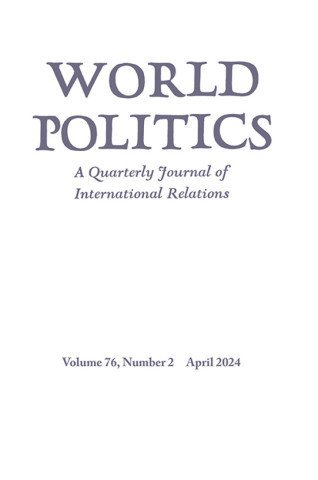改革全球治理:权力、联盟与制度绩效
IF 2.5
1区 社会学
Q1 INTERNATIONAL RELATIONS
引用次数: 2
摘要
摘要:大量文献分析了国际制度变革的决定因素,重点关注系统性政治和经济冲击的作用。然而,本文也在更多的“一切照旧”时期考虑了这个问题,询问全球治理机构何时进行改革,哪些国家从这些变化中受益。作者认为,国际组织的主要利益相关者的盟友比不结盟国家受益更多;然而,作者也记录了改革有时包含对无污染成员国的让步。这篇文章的理论是,虽然io官员在正常情况下奖励主要利益相关者的盟友,但他们在io表现不佳的时期向非盟友提供让步,以防止这些州脱离。文章分析了1944年至2018年间世界银行改革的原始数据集,并结合定性证据,发现其假设得到了重大支持。这些发现有助于理解ios内部权力转移的其他令人困惑的例子。本文章由计算机程序翻译,如有差异,请以英文原文为准。
Reforming Global Governance: Power, Alliance, and Institutional Performance
abstract:A large literature analyzes the determinants of change in international institutions, focusing on the role of systemic political and economic shocks. However, this article considers this question also in more business-as-usual periods, asking when institutions of global governance reform and which states benefit from these changes. The authors argue that allies of international organizations (io)s' leading stakeholders benefit more than nonaligned countries; however, the authors also document that reforms sometimes contain concessions to nonallied members. This article theorizes that while io officials reward major stakeholders' allies in normal times, they provide concessions to nonallies during periods of poor io performance to prevent these states from disengaging. Analyzing an original data set of reforms at the World Bank between 1944 and 2018, paired with qualitative evidence, the article finds significant support for its hypotheses. The findings help to make sense of otherwise puzzling instances of power shifts within ios.
求助全文
通过发布文献求助,成功后即可免费获取论文全文。
去求助
来源期刊

World Politics
Multiple-
CiteScore
8.40
自引率
0.00%
发文量
24
期刊介绍:
World Politics, founded in 1948, is an internationally renowned quarterly journal of political science published in both print and online versions. Open to contributions by scholars, World Politics invites submission of research articles that make theoretical and empirical contributions to the literature, review articles, and research notes bearing on problems in international relations and comparative politics. The journal does not publish articles on current affairs, policy pieces, or narratives of a journalistic nature. Articles submitted for consideration are unsolicited, except for review articles, which are usually commissioned. Published for the Princeton Institute for International and Regional Affairs
 求助内容:
求助内容: 应助结果提醒方式:
应助结果提醒方式:


